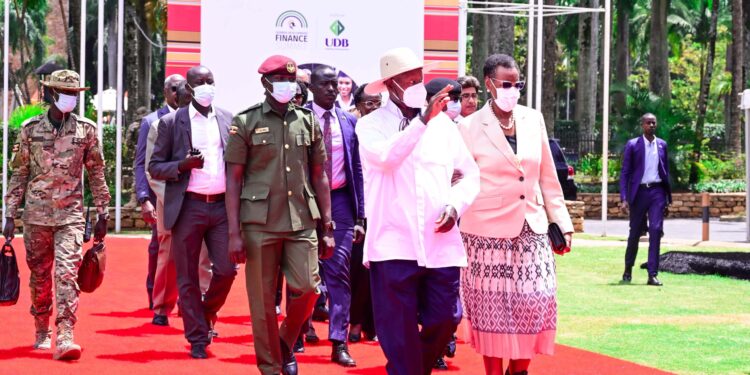Munyonyo – President Yoweri Museveni has criticised commercial banks for charging exorbitant interest rates, which he said stifles productive investment and fosters Africa’s dependence on imports.
The President made the remarks today while officially opening the inaugural Uganda Development Finance Summit at the Commonwealth Resort Hotel, Munyonyo.
“How do you lend at 22% per annum when inflation is below 5%? At such rates, people cannot do serious business, only quick import trade—perfumes and wines. These banks are engines of Africa’s dependence,” Museveni said.
He highlighted the role of the Uganda Development Bank (UDB) as an alternative source of affordable financing. “This one is ours. It will not run away. It is a guarantee,” he said.
Expanding on the problem, Museveni noted: “The problem with commercial banks is ‘Omululu’—too much greed for money. The interest rates at 22%. What is the interest rate, Ojangole? “22 percent, Your Excellency”. Within a year, you must pay back, that is per annum. If you lend me 1 million shillings, I must pay you 1.22 million in a year. How will I manage to do serious business other than importing dead people’s hair from China and selling it quickly to make money?”
He added that the high costs of commercial bank loans push Africans into short-term, low-value trade rather than industrialisation:
“Those commercial banks are making Africa dependent on imports from China, from Dubai. Because that is the only way you can earn money quickly—you buy wine, you buy spirits, perfumes, etc., and then sell them to pay back. Therefore, the answer to all of this is UDB. It is a sure guarantee because this is ours. The rest are not under our control.”
Museveni also questioned UDB’s interest rate structure, urging the development bank to focus on affordability:“But you, UDB, what are you looking for? Why 15 percent interest? Are you going to heaven or have you given up heaven? Why would you have an interest rate of 15 percent when inflation in Uganda is always less than 5 percent? You should be able to manage with a 10 percent rate.”
He further emphasised that modest salaries for bureaucrats in development institutions would allow more affordable financing: “But of course this means that the general manager must get a lower salary and all the other crowd of parasites, cleaners. ‘If he is a cleaner in UDB, he is a more enhanced cleaner than one in a government ministry’. If you had a modest lifestyle, you—the bureaucrats of these development institutions—just like Asians, until recently, I was hearing that a professor in India was earning 400 dollars. Their modest lifestyle enabled them to leave affordable money for development.”
On the broader challenge of financing development, Museveni said African leaders must think strategically: “We need an order in which our country can access funds for industrial and infrastructure projects without being limited by commercial greed. This is the answer for long-term development. All the other founding fathers understood this. They knew that Africa cannot develop relying solely on short-term profits. We need structures and institutions that prioritise long-term growth over immediate gains.”
The President stressed that Uganda Development Bank is intended to provide patient capital to the sectors that generate real wealth—commercial agriculture, manufacturing and artisanship, services such as tourism and ICT. “People don’t understand. Wealth is personal, but development is collective. Development is for the drunkards, the witch doctors, everybody. But wealth is in those four sectors. That is why our answer was UDB,” Museveni said.
“We must embrace saving and capital accumulation, understanding that development requires sacrifice. However, commercial banks are hindering progress with high interest rates of 22% when inflation is below 5%. This limits us to quick trade on non-essential goods. We need a government institution that focuses on development over profit—this is where the Uganda Development Bank comes in. It offers stable, affordable credit for productive sectors and ensures our future prosperity,” he later wrote on X.
The President was accompanied by the First Lady and Minister of Education and Sports, Maama Janet Kataaha Museveni.











